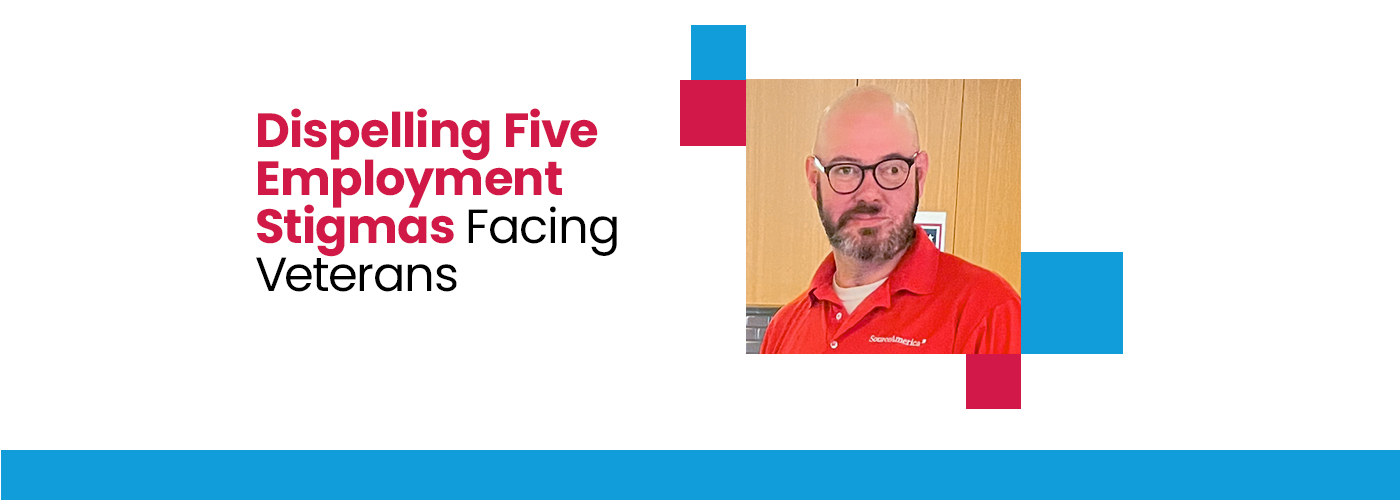Dispelling Five Employment Stigmas Facing Veterans

As a veteran with a disability, I have personally seen the challenges veterans – and specifically veterans with disabilities – often face when trying to find employment. Some of the greatest obstacles are the perceived stigmas from both employers and society that can close the door to opportunities before veterans are even given a chance. Based on my experience, here are five persistent stigmas that need to be acknowledged, addressed, and dispelled.
1. “Veterans can’t adapt to regular workplaces.”
Contrary to belief, veterans have already adapted to unfamiliar workplaces throughout their service. Service members constantly find themselves in new environments and learn to adapt quickly. As we transition to the civilian workforce, we bring that same flexibility and adaptability to the table, making us highly valuable to any employer.
2. “Veterans who may have PTSD or other mental health issues can’t fulfill their employment responsibilities.”
The stigma of mental health issues goes far beyond veterans, but it is of particular concern for those who may have suffered through traumatic experiences or are dealing with mental health concerns like Post-Traumatic Stress Disorder (PTSD). The belief that these issues may make a veteran unemployable can discourage them from seeking the care they need, and it also stereotypes veterans who have a wide range of personal experiences. As society and businesses become more aware of the need to offer support and flexibility for all employees who are facing stress, anxiety and/or depression, this is also true for veterans. Employment is often a valuable tool for veterans to work through their experiences and move forward. They can become valuable employees because of their commitment to uphold their duties and serve their country. Veterans are highly trained professionals with invaluable skills and should be given fair consideration for any job opening.
3. “Veterans are too rigid in their thinking.”
While service members follow protocols and procedures, we must be adaptable, flexible, and innovative when making quick decisions in combat or in any critical situation. What may appear to be a drawback can also be an asset. Veterans can use the protocols and disciplined thinking learned in the military to react quickly when they need to make decisions under pressure, work through complicated systems or stay calm and focused in high-stress situations. Service members also often possess positive team building skills because working as a team is paramount to unit cohesion and successful deployments.
4. “Hiring veterans with disabilities takes too much effort and money.”
While some people may think it requires an exceptional amount of time, effort and money to bring veterans with disabilities onto their staff, in fact, most accessibility accommodations are free. If there is a cost, the average cost for accommodations is $500 per employee. Also, there are many resources available to support veterans in finding work outside of active service. Organizations like the Department of Labor’s Veterans’ Employment and Training Service and the U.S. Department of Veteran Affairs’ Veterans Opportunity to Work program all have resources ready to assist veterans in finding work once they have left service. For employers, there are resources throughout the country that will help find veterans to bring into your organization, such as Hope for the Warriors and America’s Warrior Partnership.
5. “Veterans will want a military-like working environment.”
Although the military teaches adherence to rules and protocols, service members do not need a highly structured environment to flourish. The skill sets veterans acquired in the military are very adaptable. Service members, whether they served four years or more than 20, have also gained leadership skills from a young age. Likewise, they are adept at executing meticulously detailed orders. These two skills alone lend themselves well to any position in the civilian sector.
In summary, veterans have a lot to offer any organization willing to acknowledge and move beyond these perceived stigmas. Hiring veterans can promote a higher performing and more diverse work environment. I am proud to say that SourceAmerica hired me to look specifically at initiatives, tools and resources to help SourceAmerica and our network of nonprofits hire more veterans. It’s time to dispel these myths and recognize veterans’ talents and value in every workplace.